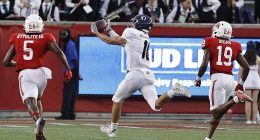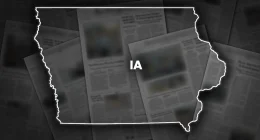Premiering Dec. 9, And Just Like That, HBO’s hotly anticipated Sex and the City series sequel, reveals a handful of new characters. Tony Award winner Sara Ramírez (they/them) plays Che Diaz, the show’s first nonbinary character, who works as a stand-up comedian and hosts a podcast on which Carrie Bradshaw is regularly featured. Ramírez, 46, who is bisexual and came out as nonbinary last year, has been celebrated for their representation of queer characters on TV throughout their career (including Dr. Callie Torres, a bisexual surgeon on Grey’s Anatomy, whom Ramírez portrayed for over 10 seasons). The Mexican American actor — who was honored with the Trailblazers Award by the New York LGBT Center in 2017 and the Ally for Equity Award by the Human Rights Campaign Foundation in 2015 — talked about what this moment means for them.
What is the character of Che like?
Che is this smart, funny, dynamic stand-up comedian and is a host of their own podcast that Carrie Bradshaw is featured on. What I really love about Che is that they are unapologetically themselves. They worked really hard to get to where they are, and they’re being presented as a multifaceted, three-dimensional character. They’re not here to represent an entire community. They are here to represent one fictional character. And they happen to be a huge fan of Carrie Bradshaw.
It’s thrilling to be on the show in this way. Back in the 90s when I was first starting out in this industry, I watched Sex and the City as a fan, and dreamt about guest-starring on it. And when the series ended, I thought, ‘Well, there goes that dream.’ So you can imagine that when [showrunner] Michael Patrick King offered me this role in a Zoom meeting last January, I was elated.
Was Che written as nonbinary before you got the role or did your experience and identity inspire the character?
I think when the role was written, there was a need for different kinds of storylines, but there was also Michael Patrick King, who told me that he wrote the role for me. Che is there to push forward different kinds of storylines, and they’re also there to inspire certain characters to question their own internalized oppression. I think they also inspire people around the fact that life is not over after 40. There’s some space to rediscover who we are, and that’s a big part of the show. I think the fact that there are women in their 50s and a non-binary character in their 40s makes [checking in with these lives] worthwhile … typically in the industry, we are conditioned to believe that after a certain age, certain genders and certain types of people are not worth checking into or seeing on screen. This show is hoping to inspire people to think beyond that.
I can imagine that there’s probably equal parts pressure and excitement finding your place in a show that already has such a reputation and a fan base. How did you navigate entering a world that has been established and carving your own space in it?
Michael Patrick King and Sarah Jessica Parker have been very intentional with the introduction of new characters on the show. They have been very mindful not to tokenize anyone. They have been caring and thoughtful around creating characters that have full lives. They’re not just there to represent one identity. They are there to represent a full life. And I’ve really appreciated that thoughtfulness. We’ve also enlisted support from GLAAD to ensure that what we’re putting out there is thoughtful and intentional and is in line with the kinds of stories that we want to be represented on television as far as non-binary representation is involved. I really appreciate all the ways that I have felt supported. We have incredible writers in the writers room: one person that I’m a huge fan of is Samantha Irby who is one of our writers who also happens to be queer and Black. I’m really grateful for Sam’s input, contribution and participation in this particular reboot.
The world was a little different when you were playing Dr. Callie Torres from 2006 to 2016.
Dr. Callie Torres was not initially identified as queer when I first agreed to play her. It wasn’t until we were in season two that I suggested to Shonda Rhimes that we investigate her sexual orientation to be bisexual, to be pansexual, to be queer. At that time, I was not out publicly about being bi and pan and queer; I definitely felt that the context was a different one from the one that we’re in today. I felt a lot more fear around how Hollywood would perceive me. Sometimes our own community can be really terrible to bisexual people, people who are attracted to more than one gender. And so, in fact, I was more concerned about how the LGBTQIA+ community would view me, and how the LGBTQIA+ community within Hollywood would view me, since we do have a lot of powerful gay people at the top, whether they’re out or not.
I was particularly nervous about coming out publicly but one way I knew that I could continue to infuse my work with representation was to open up this possibility for Callie Torres and so we dove in with the help and the support of GLAAD, and it was really affirming and it was also a tender and vulnerable process because when you are doing something for the first time on a show that is diving in to a territory that is unfamiliar, you can sometimes touch on things that may trigger folks, and we were all trying to be very intentional and mindful around how we were unfolding Callie’s storyline. So I knew and Shonda knew and everyone else in the writer’s room knew that that we weren’t really going for perfection, we were going for progress. And I know that our community has been wonderful in embracing that notion, even if our community may not always be great at practicing it.
You were born in Mexico, studied at Juilliard, and worked in Los Angeles for several years. How meaningful is the environment of New York City to you?
New York City has played such a huge role in my life and is playing a huge role in And Just Like That, just like it played a huge role in the original Sex and the City. It’s a place that symbolizes and has symbolized possibility and dreams coming true. It’s a place that can lift you up and humble you just as quickly. It’s a place that is alive and it does something to people, it’s an energy that impacts people. It has its own complex history and its own beauty and there’s so many different forms of beauty all projected at the same time here in New York City. And you know one thing that Che and I have in common is that we both really, really love New York City. Che, however, loves New York City so much that they have tattooed the Empire State Building on their arm.
Interview edited for length and clarity.

This story first appeared in the Dec. 8 issue of The Hollywood Reporter magazine. Click here to subscribe.
Source: Hollywood









